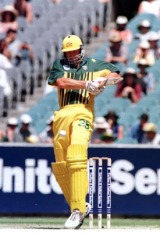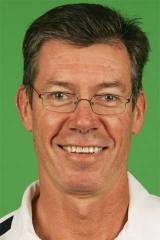
|

Tom Moody has joined the band of Australian coaches to head international programs
© Getty Images
|
|
Australia's major exports have traditionally been sheep, wheat and meat. Mining and technology joined in and an emerging industry has become prominent with the posting of international coaches. Greg Chappell and Tom Moody have dived into the market over the past week to increase the trail of boxing kangaroos providing sustenance to other nations.
While Australia is prepared to trade heavily in the other sectors, the direction of cricket-badge wielders is only heading out. Overseas investment is greeted with smiles and batting-grip handshakes, but foreign talent - especially coaching - is usually snubbed as unnecessary. Ideological barbed wire surrounds the northern coastline to protect the country from illegal immigrants and asylum seekers. A similar thought barrier must exist for those contemplating emigrating Down Under with a couple of tracksuits and a bag of training balls.
John Buchanan's current contract expires in October, but the odds of him being replaced by an alien dictator are as high as Graham Thorpe, one of the rare playing exceptions, becoming an Australian citizen. A Buchanan extension is much more likely, so the failed applicants from the India and Sri Lanka jobs should not start licking par avion stamps yet. But it's tempting to think that the all-abroad resumes would head straight to Cricket Australia's version of the Baxter Detention Centre for processing, even if they had valid reasons for escaping their nation's on-field persecution.
Bulging trophy cabinets and internal resources mean the chance in the near future of a non-Baggy Green joining a rendition of `Beneath the Southern Cross' is nil. Compare it with the likelihood of the government ordering more cane toads from Hawaii. India, England and West Indies had similar expectations a decade ago, and should be praised for chasing improvement over not-much-conquering nationalism.
Australia have had only had three full-time coaches in their history and the consistency of appointees has helped create the current dynasty. Bob Simpson began the trend on a tour to New Zealand in 1986, instilling a strong work ethic and taking pressure and power from Allan Border. Taking over in 1996, Geoff Marsh modernised the program with a full-time fitness advisor, computer analyst and up-to-date rehabilitation methods while Buchanan, who arrived after the 1999 World Cup win, drove things further with his wide-ranging philosophies.
Buchanan has used a baseball coach, a yoga instructor and brief appointments of on-tour consultants, particularly with former spin bowlers on the subcontinent. Maybe the next step will be a host of country-specific coaches - could they consider Graham Gooch as an advisor on Ashes tours or have Eric Simons on the inside for the home-and-away South Africa series in 2005-06? - who travel full-time with the team for the length of the trip. With the emphasis on "assistant".

|

The current contract of John Buchanan, one of three full-time Australia coaches, expires in October
© Getty Images
|
|
How could Australia benefit from a foreign representative? Ray Jennings has some free time and would quickly try to scare off the slip-cordon fumbles with his after-play dropped-catches punishment; Duncan Fletcher apparently enjoys sunny climes, but would have a tough time getting the mostly cheerful men to don his strict game face; and John Wright's ability to deal with superstar personalities would be a largely redundant qualification. It shows how self-sufficient Australia's 20-year-old playing and mentoring development programs have become.
"The long-term aim anywhere is to have someone from your own country coaching your side," Chappell said when he became a consultant to Pakistan last year. "But the sharing of ideas is a great thing." At the moment Australia is distributing most of the produce. Chappell is in India, Moody has taken over Sri Lanka from John Dyson who replaced Dav Whatmore, the Bangladesh coach, and Bennett King is trying to cope with the dysfunction of West Indies. Steve Rixon was in charge of New Zealand and now looks after Surrey while Geoff Marsh and Carl Rackemann sat quietly in Zimbabwe. Whenever a job becomes available a host of Australian passport numbers arrive, but there is no reciprocal arrangement.
Fear of invasion has been a theme of Australia's history and its cricket team is not planning to succumb on or off the field. A dip worse than the suffering of the mid-1980s would be required even to consider such a coaching move. At the moment both thoughts - as tempting as they are to some locals and the rest of the world - are as unlikely as the nation giving up lamb, beef and bread.
Peter English is the Australasian editor of Cricinfo.



